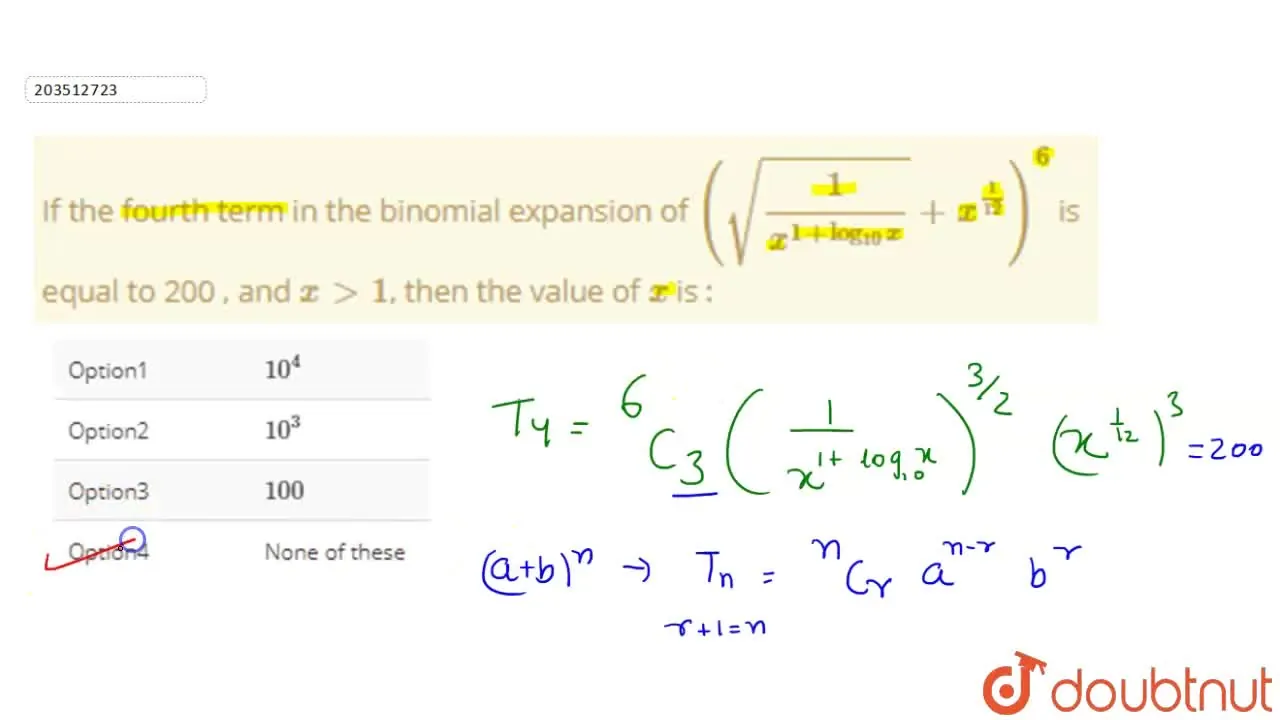If the fourth term in the binomial expansion of (√1x1+log10x+x112)6 is equal to 200 , and x>1, then the value of x is :
The correct Answer is:10
Step by step video, text & image solution for If the fourth term in the binomial expansion of (sqrt ((1)/(x ^( 1 + log _10x) )) + x ^((1)/(12)) ) ^ 6 is equal to 200 , and x gt 1 , then the value of x is : by Maths experts to help you in doubts & scoring excellent marks in Class 12 exams.
Related Playlists
- BOOK - DISHA PUBLICATIONCHAPTER - CHAPTERWISE NUMERIC INTEGER ANSWER QUESTIONSEXERCISE - CHAPTER 915videos
CHAPTERWISE NUMERIC INTEGER ANSWER QUESTIONS
- BOOK - DISHA PUBLICATIONCHAPTER - CHAPTERWISE NUMERIC INTEGER ANSWER QUESTIONSEXERCISE - CHAPTER 1015videos
CHAPTERWISE NUMERIC INTEGER ANSWER QUESTIONS
- BOOK - DISHA PUBLICATIONCHAPTER - CHAPTERWISE NUMERIC INTEGER ANSWER QUESTIONSEXERCISE - CHAPTER 715videos
CHAPTERWISE NUMERIC INTEGER ANSWER QUESTIONS
- BOOK - DISHA PUBLICATIONCHAPTER - BINOMIAL THEOREM EXERCISE - EXERCISE-2 (CONCEPT APPLICATOR)30videos
BINOMIAL THEOREM
- BOOK - DISHA PUBLICATIONCHAPTER - COMPLEX NUMBERS AND QUADRATIC EQUATIONS EXERCISE - Exercise -2 : Concept Applicator30videos
COMPLEX NUMBERS AND QUADRATIC EQUATIONS
Similar Questions
Find the 10th term in the binomial expansion of (2x2+1x)12.
View SolutionBinomial expansion of (x+1)6
View SolutionThe 4th term in the expansion of (√x+1x)12 is
View SolutionIf the fourth term in the binomial expansion of [√x11+log10x+x112]6 is equal to 200 and x>1, then the value of x is
View SolutionConstant term in the expansion of (x−1x)10 is -
View SolutionIf the 6th term in the expansion of(1x83+x2(log)10x)8 is 5600, then x equals 1 b. (log)e10 c. 10 d. x does not exist
View SolutionThe constant term in the expansion of x+loge(1−x)x3 is
View SolutionIf the middle term in the binomial expansion of (1x+xsinx10) is equal to 638, find the value of x.
View SolutionThe fourth term in the binomial expansion of (x2−1x3)n is independent of x , when n is equal to
View SolutionIf the 6th term in the expansion of [1x83+x2log10x]8 is 5600, then x =
View Solution


